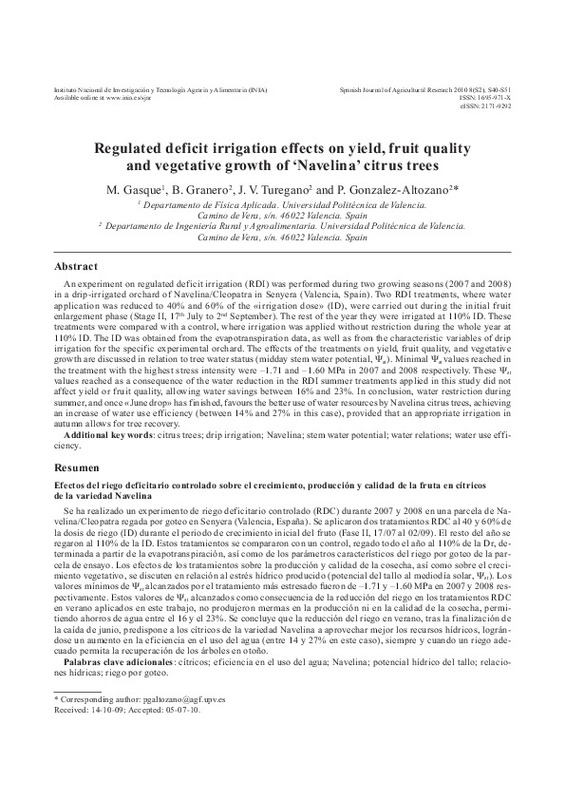|
Resumen:
|
[EN] An experiment on regulated deficit irrigation (RDI) was performed during two growing seasons (2007 and 2008) in a drip-irrigated orchard of Navelina/Cleopatra in Senyera (Valencia, Spain). Two RDI treatments, where ...[+]
[EN] An experiment on regulated deficit irrigation (RDI) was performed during two growing seasons (2007 and 2008) in a drip-irrigated orchard of Navelina/Cleopatra in Senyera (Valencia, Spain). Two RDI treatments, where water application was reduced to 40% and 60% of the irrigation dose (ID), were carried out during the initial fruit enlargement phase (Stage II, 17(th) July to 2(nd) September). The rest of the year they were irrigated at 110% ID. These treatments were compared with a control, where irrigation was applied without restriction during the whole year at 110% ID. The ID was obtained from the evapotranspiration data, as well as from the characteristic variables of drip irrigation for the specific experimental orchard. The effects of the treatments on yield, fruit quality, and vegetative growth are discussed in relation to tree water status (midday stem water potential, Psi(st)). Minimal Psi(st) values reached in the treatment with the highest stress intensity were -1.71 and -1.60 MPa in 2007 and 2008 respectively. These Psi(st), values reached as a consequence of the water reduction in the RDI summer treatments applied in this study did not affect yield or fruit quality, allowing water savings between 16% and 23%. In conclusion, water restriction during summer, and once "June drop" has finished, favours the better use of water resources by Navelina citrus trees, achieving an increase of water use efficiency (between 14% and 27% in this case), provided that an appropriate irrigation in autumn allows for tree recovery.
[-]
[ES] Se ha realizado un experimento de riego deficitario controlado (RDC) durante 2007 y 2008 en una parcela de Navelina/Cleopatra regada por goteo en Senyera (Valencia, España). Se aplicaron dos tratamientos RDC al 40 y ...[+]
[ES] Se ha realizado un experimento de riego deficitario controlado (RDC) durante 2007 y 2008 en una parcela de Navelina/Cleopatra regada por goteo en Senyera (Valencia, España). Se aplicaron dos tratamientos RDC al 40 y 60% de
la dosis de riego (ID) durante el periodo de crecimiento inicial del fruto (Fase II, 17/07 al 02/09). El resto del año se
regaron al 110% de la ID. Estos tratamientos se compararon con un control, regado todo el año al 110% de la Dr, determinada a partir de la evapotranspiración, así como de los parámetros característicos del riego por goteo de la parcela de ensayo. Los efectos de los tratamientos sobre la producción y calidad de la cosecha, así como sobre el crecimiento vegetativo, se discuten en relación al estrés hídrico producido (potencial del tallo al mediodía solar, ¿st). Los
valores mínimos de ¿st alcanzados por el tratamiento más estresado fueron de ¿1.71 y ¿1.60 MPa en 2007 y 2008 respectivamente. Estos valores de ¿st alcanzados como consecuencia de la reducción del riego en los tratamientos RDC
en verano aplicados en este trabajo, no produjeron mermas en la producción ni en la calidad de la cosecha, permitiendo ahorros de agua entre el 16 y el 23%. Se concluye que la reducción del riego en verano, tras la finalización de
la caída de junio, predispone a los cítricos de la variedad Navelina a aprovechar mejor los recursos hídricos, lográndose un aumento en la eficiencia en el uso del agua (entre 14 y 27% en este caso), siempre y cuando un riego adecuado permita la recuperación de los árboles en otoño.
[-]
|
|
Agradecimientos:
|
This experiment was financed by the company Tecnicas Valencianas del Agua S.A. (TECVASA), who obtained a subsidy from the Conselleria de Agricultura, Pesca y Alimentacion de la Generalitat Valenciana for this purpose (DOCV ...[+]
This experiment was financed by the company Tecnicas Valencianas del Agua S.A. (TECVASA), who obtained a subsidy from the Conselleria de Agricultura, Pesca y Alimentacion de la Generalitat Valenciana for this purpose (DOCV 5493, 19 April 2007, no. exp.: 2007TAHAVAL00018).
[-]
|









